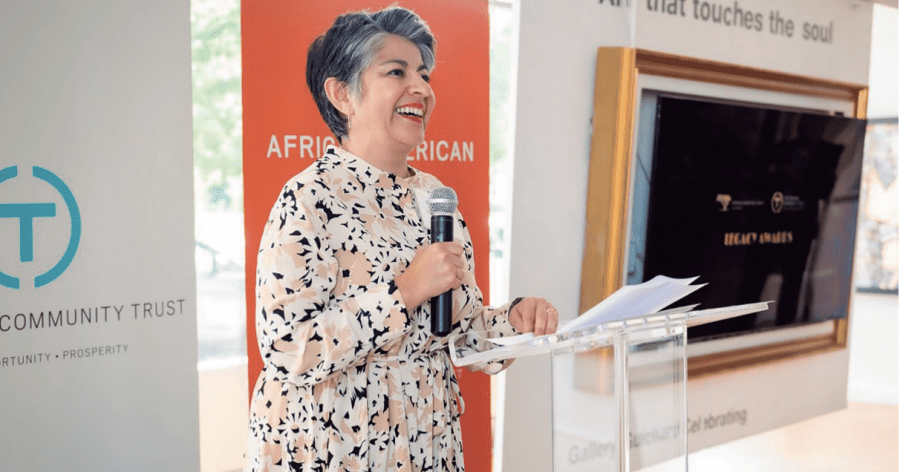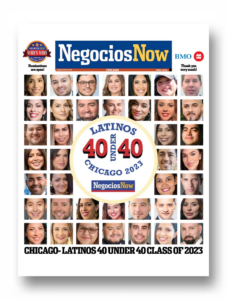Exclusive interview with Andrea Saenz, following her appointment as the new president and CEO of the Chicago Community Trust, a charitable organization founded more than a century ago and holding an investment portfolio worth $4.7 billion.
By David Steinkraus
Until a month ago, Andrea Sáenz was the interim president and CEO of The Chicago Community Trust. Now she is its first Latina president and CEO.
She moved to the top job after five years as chief operating officer. Now away from the details of daily operations, she said, “I get to spend a lot more of my time with our partners, which is wonderful.”
Founded in 1915, the trust is a philanthropic organization with a $4.7 billion investment portfolio and a goal of improving the wellbeing of Chicagoans.
Los Angeles first
Sáenz came to Los Angeles from Quito, Ecuador, with her parents when she was 5. She remains connected to Quito. Her father retired there, and she still has family there.
Her father had started and lost a small business in Quito, she said. His dream was to work in the United States and save money, then return to Quito and open another business. That day never came, she said.
“I would say my family had everything we needed and not more,” she said. “It was very much, we’re getting by, and we’re OK, and my parents were always a little stressed about how we were going to get by and often took additional jobs to make sure we got by.”
She came to Chicago because of her husband, who grew up here. They met during college in California (Sáenz graduated from Scripps College in Claremont, California, in 1995 with a bachelor’s degree in Latin American studies) and later lived in Philadelphia. There Sáenz learned she liked urban living, and Chicago is a better version of that, she said. “And I still find winter interesting.”
Social change
Nonprofit work was not an early passion but a path she found. “I really started volunteering my time from high school through college with organizations whose values spoke to me. My values always drew me to want to make positive social change,” she said. “I’ve never really been motivated by much else.”
She began volunteering with California community organizations when the strongly anti-immigrant Proposition 187 was passed by popular vote in 1994. (A court later found it unconstitutional.) In Philadelphia her volunteer work became a full-time job, and she said she went to graduate school to learn the skills she needed for a career. She received a master’s degree in public administration from the University of Pennsylvania in 2006.
Wealth gap
The top issue for the trust is the wealth gap between white people and Black and Latinx communities. Sáenz said this has persisted and widened over generations. Before the pandemic, the gap wasn’t much talked about, she said, but the combination of the pandemic with calls for racial justice amplified the dangers of inequity and the need for change.
Education remains important, she said. Income disparities are starting to close, and educational disparities are starting to close, but there isn’t necessarily more economic stability for a Black and Latino generation that is better educated than their parents, and earning more, but is struggling with higher debt and cannot build wealth through home ownership.
An analysis of Chicago she read found private investment is lacking in minority areas. For every $4.60 of private capital flowing into majority white neighborhoods, she said, Latino neighborhoods receive $2.60, and Black neighborhoods receive $1. It’s estimated that removing segregation and the wealth gap could increase the area’s annual growth by $4 billion to $8 billion, she said.
Two primary changes can help alleviate this, she said. One is to induce more private investments in neighborhoods so people have jobs, services, and the other components of a vibrant economy. The other is to work at the household level where people build assets, make those assets available to all families, and provide the financial services that help people avoid debt and plan for the future. “That’s actually a harder one because of the complexities beyond just getting investors to come in and bring resources,” she said.
Chicago’s businesses have a tremendously important role in this, Sáenz said. Employment decisions, procurement decisions, and a commitment to equity and inclusion as a business strategy can make a great difference in the lives of Black and Latino people and help them build generational wealth, she said.
Listening first
Although she spent many years as chief operating officer of the trust, Sáenz said she isn’t coming into the CEO job with a list of changes.
“I really do want to take some time to hear from partners and very intentionally explore that question about how we get greater clarity about where our work is having the greatest impact and where there are opportunities to double down,” she said.











